Contrary to popular belief, the odds against the opposition parties in the three upcoming by-elections are very high despite the usual euphoria that nomination day promised.
PAS, which is the best organised of the trio in Pakatan Rakyat, understands the reality on the ground. It knows that in Bukit Gantang, the BN has managed to insert ethnic overtones into the entire Perak state governmental tussle.
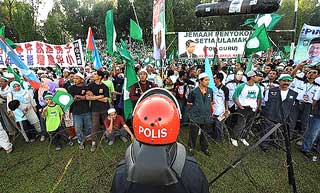 The Perak Pakatan government, the message spells out, was dominated by the DAP (read Chinese) and Umno had to resort to extra-legal means to protect Malay rights. Malay royalty is now Umno’s flag of choice.
The Perak Pakatan government, the message spells out, was dominated by the DAP (read Chinese) and Umno had to resort to extra-legal means to protect Malay rights. Malay royalty is now Umno’s flag of choice.
But the fight is quite equal for PAS has two strong political weapons: the Malay language and Islam. The use of English for the teaching of maths and science is not going down well on the ground.
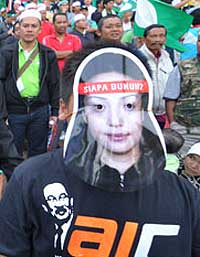 Furthermore, the morality issue involving French submarine deals and the murder of Altantuya Shaariibuu will continue to feature prominently. It remains to be seen if Malay voters in Bukit Gantang are more Muslim than they are Malay as in Kuala Terengganu.
Furthermore, the morality issue involving French submarine deals and the murder of Altantuya Shaariibuu will continue to feature prominently. It remains to be seen if Malay voters in Bukit Gantang are more Muslim than they are Malay as in Kuala Terengganu.
The BN is now also reinvigorated by a new Umno leadership. Dr Mahathir Mohamad also seems to have returned to the fold. Chinese voters will be hard-pressed now to either continue voting for change and a more equitable future versus a return to the golden age of political stability under Umno-dominated BN.
Here again, the DAP and PKR will have to work very hard to get the message across, which is that a stronger Umno simply means weaker roles for BN component parties. It was after all a strong Umno within BN that gave rise to the situation prior to the 12th general elections.
Nonetheless, the odds are stacked against the opposition because Chinese voters will have to think hard between present needs versus future rights. But more alarmingly for the Pakatan, the first chink in its armour is showing in Bukit Selambau with its multiple candidates.
Hindraf a double-edged sword
Most commentators have it at the back of their minds but find it difficult to say that the Indian community in Malaysia have always been a divided lot. Despite the rhetoric of the MIC, there is really no such thing as a monolithic Indian Malaysian community.
Indian Malaysians have been divided along the lines of caste, place of origin, language, class and political affiliation. It was the dominance of the BN that gave the impression that the Indians were united under the MIC.
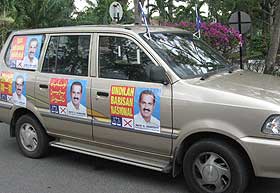 But like the recently concluded MIC presidential nominations, where there is only one approved candidate, that unity is more forced than a result of natural consensus. A dominant MIC did not solve Indian problems either but the MIC would have us believe that without them the situation would be worse.
But like the recently concluded MIC presidential nominations, where there is only one approved candidate, that unity is more forced than a result of natural consensus. A dominant MIC did not solve Indian problems either but the MIC would have us believe that without them the situation would be worse.
The challenge now lies with the ability of the Pakatan to swing Indian votes despite all the fractious Indian political figures.
In Kuala Terengganu, Pakatan learned an invaluable lesson: never sweep political differences behind closed doors. The DAP and PAS stood their ground and the Pakatan won. In Bukit Selambau, the scenario is very similar except that it is PKR that is facing the acid test. It must prove that it is bigger than Anwar Ibrahim.
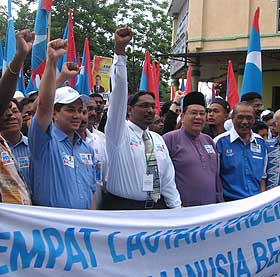 PKR, in its attempt to be everything to everybody, has lost some support. Hindraf, with is radical race-based agenda, is proving to be a double-edged sword. However, it would be wise for PKR to stand by its principles, like PAS and DAP, even if it means losing crucial votes. The party cannot compromise on its non-sectarian agenda.
PKR, in its attempt to be everything to everybody, has lost some support. Hindraf, with is radical race-based agenda, is proving to be a double-edged sword. However, it would be wise for PKR to stand by its principles, like PAS and DAP, even if it means losing crucial votes. The party cannot compromise on its non-sectarian agenda.
In Batang Ai, the odds are firmly stacked against the opposition especially with the resources that the BN commands. It will be a miracle if the Pakatan can win the seat. Here, and throughout the state, the Dayak vote is often divided and this makes them political losers. It will not be anytime soon that the Dayaks can get their act together.
Thus, the Pakatan faces the ultimate test of its young life: the test of ideology. It claims to be non-sectarian and to fight for justice for all. Malaysians should be glad that there is a political
coalition with such an agenda.
BN singing the same tune
On the other hand, the BN is also singing the same tune but the recently concluded Umno AGM shows that it will be tough for the ruling coalition to turn vision into reality.
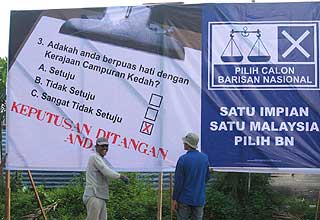 The three by-elections can be used to send a clear message to Umno that reform must take into account national consensus. The BN can win by taking advantage of the divided Indian and Dayak votes and by playing the racial card. It must be told that Malaysians reject such
The three by-elections can be used to send a clear message to Umno that reform must take into account national consensus. The BN can win by taking advantage of the divided Indian and Dayak votes and by playing the racial card. It must be told that Malaysians reject such
divisive methods.
Similarly, Pakatan must come out with a shadow cabinet and galvanise support for consensus building on a national scale to solve problems of social and economic inequality, something felt most keenly by the Indian community in Bukit Selambau and, I suspect, elsewhere.
It is time to forge ahead as a nation and not as fractious political parties. The coalition that makes the first move towards augmenting this national agenda will probably win, not just three by-elections but the next general elections as well.
NEIL KHOR has recently completed his PhD at the University of Cambridge. He is co-author of Non-Sectarian Politics in Malaysia: The Case of Parti Gerakan Rakyat Malaysia (2008).

